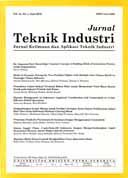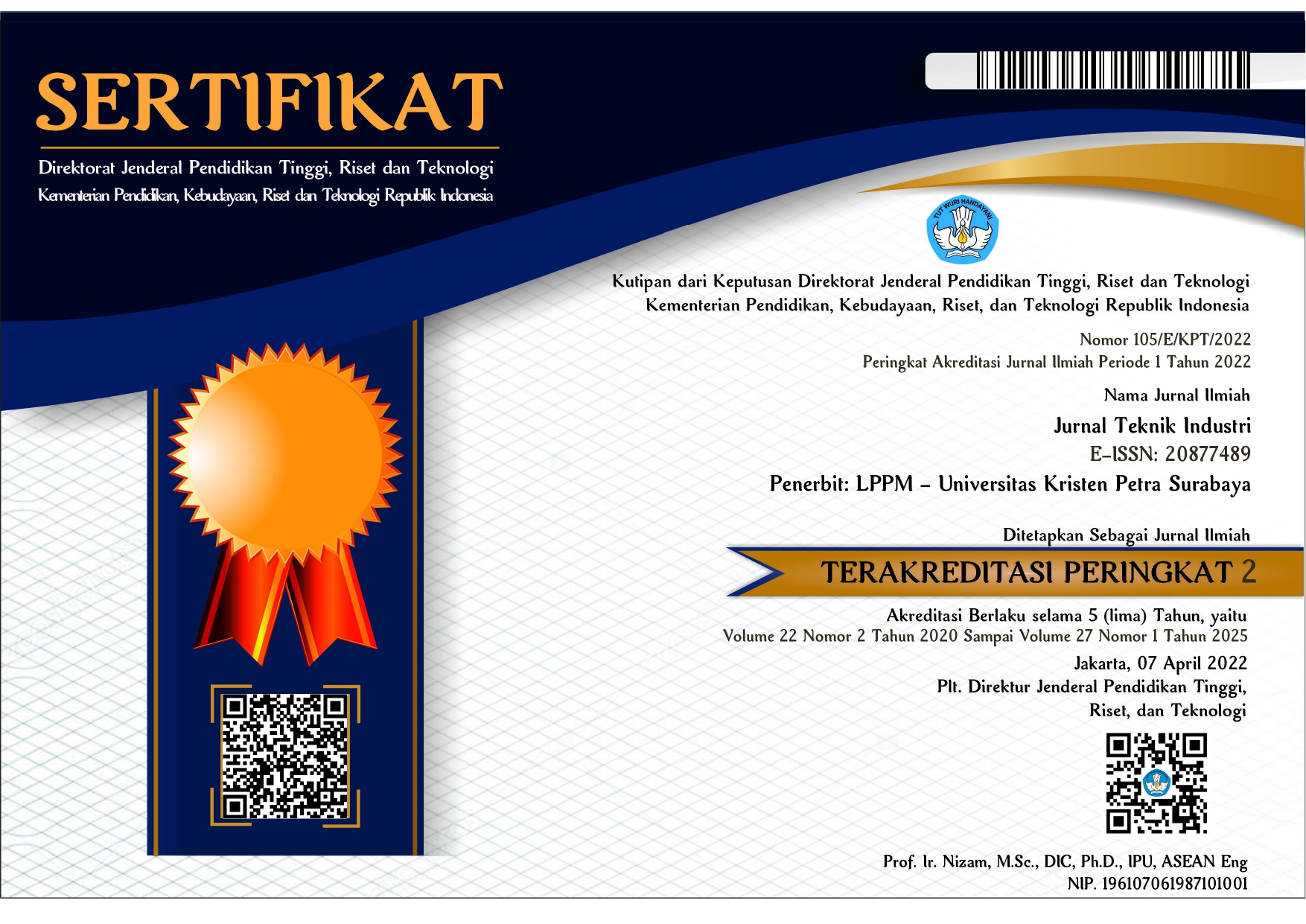Tacit Knowledge and Product Information about the Environmental Impact towards the Purchase Intention of Electric Motorcycles
DOI:
https://doi.org/10.9744/jti.23.2.149-160Keywords:
Electric motorcycles (EMCs), electric vehicles (EVs), consumer behavior, tacit knowledge, attitude towards the environment, product information, purchase intentionAbstract
In recent years, Indonesia has started to adopt electric motorcycles (EMCs), but until 2019 the market share of electric vehicles (EVs) was only around 0.05%. This figure is far from the target set by the Ministry of Industry of a 20% market share in 2025. This quantitative research was conducted to get a novel picture of what potential customers think about EMC products. The proposed model used structural equation modelling with SmartPLS-3 over 300 respondents. The research found that detailed product information positively and significantly influences consumer attitudes toward adopting EMCs. Tacit knowledge also positively and significantly influences consumer attitudes toward the environment. Furthermore, tacit knowledge directly affects the purchase intention of EMCs with a significant and positive value. As the mediating variable, consumer attitudes towards the environment have no mediation effect toward purchase intention. These findings are expected to increase the public’s knowledge and awareness of the environmental impact in determining which EMC products are more environmentally friendly than others. Here, environmentally friendly means the absence of direct emissions on vehicle exhaust and the total direct and indirect emissions.
Downloads
References
Tonko, M., and Gidwani, M., Roland Berger Focus. Motorcycle Growth Prospect in Southeast Asia: Rise of Business Use Two- Wheelers, 2018, pp 2-7.
Baumann, M., Simon, B., Dura, H., and Weil, M. The Contribution of Electric Vehicles to the Changes of Airborneemissions, 2nd IEEE ENERGYCON Conference and Exhibition, 2012.
Athanasopouloua, L., and Bikasa, H., Compa-rative Well-to-Wheel Emissions Assessment of Internal Combustion Engine and Battery Electric Vehicles. Elsevier, 6th CIRP Global Web Conference, 2018.
Kumara, K., Future Power Train Technology Scenario. The 27th GAIKINDO Indonesia International Auto Show, Jakarta: GAIKINDO, 2019, pp . 2-6.
Gaikindo, Retrieved from GAIKINDO: https://www.gaikindo.or.id/gaikindo-penjualan-mobil-januari-sampai- november-2019-dekati-1-juta-unit, 2019, December.
Utami, M. W., Yuniaristanto, and Sutopo, W, Adoption Intention Model of Electric Vehicle in Indonesia, Jurnal Optimasi Sistem Industri, 19(1), 2020, pp. 70-81.
Yuliani, W., Pendanaan Inovasi dalam Inovasi Teknologi Power Train Kendaraan Masa Depan untuk Pasar Indonesia. GAIKINDO Future Power Train Scenario Jakarta: RISTEKDIKTI, 2019, pp. 2-23.
Riyanto, Nuryakin, C., Riyadi, S. A., and Massie, N. W., Estimating the Total Cost of Ownership (TCO) of Electrified Vehicle in Indonesia. LPEM-FEBUI, 2020, pp. 2-15.
Prasetio, E. A., F, B. P., and Anggarini, L., Acceptance of Electric Vehicle in Indonesia: Case Study in Bandung. 2019 6th International Conference on Electric Vehicular Technology (ICEVT), 2020.
Coffman, M., Bernstain, P., and Wee, S., Electric Vehicles Revisited: A Review of Factors that Affect Adoption. Transport Reviews, 2017, pp. 79-93.
Chiu, Y. C., and Tzeng, G. H., The Market Acceptance of Electric Motorcycles in Taiwan Experience through a Stated Preference Analysis. Pergamon: Transportation Research Part D 4, 1999, pp. 127-146.
Niikuni, T., and Koshika, K., Investigation of CO2 Emissions in Usage Phase Due to an Electric Vehicle - Study of Battery Degradation Impact on Emissions- EVS27 International Battery, Hybrid and Fuel Cell Electric Vehicle Symposium 1, 2013.
Dumortier, J., and al, e., Effects of Providing Total Cost of Ownership Information on Con-sumers’ Intent to Purchase a Hybrid or Plug-in Electric Vehicle, Transportation Research Part A: Policy and Practice, 72, 2015, pp. 71-86.
Levay, P. Z., Drossinos, Y., and Thiel, C., The Effect of Fiscal Incentives on Market Penetration of Electric Vehicles: A Pairwise Comparison of Total Cost of Ownership. Elsevier: Energy Policy 105, 2017, pp. 524–533
Palmer, K., Wadud, Z., Tate, J. E., and Nellthrop, J., Total Cost of Ownership and Market Share for Hybrid and Electric Vehicles in the UK, US and Japan. Elsevier: Applied Energy,209, 2017, pp. 108-119.
Vilchez, J., Kelleher, L., and Thiel, C., Electric Car Purchase Price as a Factor Determining Consumers’ Choice and their Views on Incentives in Europe. Sustainability, MDPI. 2019.
Syamnur, F. H., Pambudi, N. A., Biddinika, M. K., and Wardani, N. S., Barriers to the adoption, acceptance and public perceptions of Electric Vehicles (EV) in Indonesia: Case studies in the city of Surakarta. Journal of Physics: Conference Series. 2019.
Setiawan, I. C., Policy Simulation of Electricity-Based Vehicle Utilization in Indonesia (Electrified Vehicle - HEV, PHEV, BEV and FCEV). Journal UNIMMA - Automotive Experiences, 2(1), 2019, pp 1- 8.
Prianjani, D., Sutopo, W., Hisjam, M., and Pujiyanto, E., Sustainable Supply Chain Planning for Swap Battery System: Case Study Electric Motorcycle Applications in Indonesia. IOP Conf. Series: Materials Science and Engineering, 2019.
Anfinsen, M., Lagesen, V. A., and Ryghaug, M. Green and gendered? Cultural perspectives on the road towards electric vehicles in Norway. Journal of Transportation Research Part D, 2019, pp 37-46.
Yousif, R. O., and Alsamydai, M. J., Perspective of Technological Acceptance Model toward Electric Vehicle. International Journal of Mechanical and Production Engineering Research and Development, 9, 2019, pp. 873-884.
Chubachi, K., Alternative Power Train Technology in The World. GAIKINDO Seminar of Future Power Train Technology, Jakarta: Honda RandD Indonesia, 2019, p. 35.
Bang, H. K., Ellinger, A. E., Hadjimarcou, J., and Traichal, P. A., Consumer Concern, Knowledge, Belief, and Attitude toward Renewable Energy: An Application of the Reasoned Action Theory. Psychology and Marketing, 17(6), 2000, pp 449-468.
Fishbein, M., and Ajzen, I., Belief, Attitude, Intention, and Behavior: An Introduction to Theory and Research. Reading, MA: Addison-Wesley, 1975.
Afroz, R., and Rahman, A., How Individual Values and Attitude Influence Consumers’ Purchase Intention of Electric Vehicles—Some Insights from Kuala Lumpur, Malaysia. Journal of Environment and Urbanization Asia, 6(2), 2015. pp 1–18.
Ozaki, R., and Sevastyanova, K., Going Hybrid: An Analysis of Consumer Purchase Motivations. Energy Policy, 39(5), 2011, pp 2217-2227.
Lunn, P., Choisdealbha, A. N., and Timmons, S., Experimental Evidence for the Effect of Emmision Charge and Efficiency Information on Consumer Car Choice, Journal of Cleaner Production, 254, 2020, pp. 120-140.
Haryanto, J. O., Konsumerisme dan Pepesan Kosong, (2020, November 30). Retrieved from Industry.co.id: https://www.industry.co.id/read/77492/konsu merisme-dan-pepesan-kosong
Yang, S., and Zhang, D., Market Cultivation of Electric Vehicles in China: A Survey Based on Consumer Behavior. Sustainability-MDPI, 2018.
Wang, S., Wang, J., and Li, J., Policy Implications for Promoting the Adoption of Electric Vehicles: Do Consumer’s Knowledge, Perceived Risk and Financial Incentive Policy Matter? Transportation Research Part A: Policy and Practice, 117, 2018, pp 58-69
Lebeau, K., and Mierlo, J. V., Consumer Attitudes towards Battery Electric Vehicles: A Large-scale Survey, Journal of Electric and Hybrid Vehicles, 5 (1), 2013, pp.28-41.
Chen, T. B., and Chai, L. T.,|Attitude towards the Environment and Green Products: Consumers’ Perspective, Management Science and Engineering, 4(2), 2010, pp. 27-39
Blackwell, R. D., Miniard P. W, and Engel, J.F., Consumer Behavior (10th ed.). South Western: Thomson Learning, 2006.
Allport, G. W., Attitudes. In a Handbook of Social Psychology. Worcester, MA: Clark University, 1935.
Schiffman, L. G., and Kanuk, L. L., Consumer Behavior, 7th edition. New Jersey USA: Prentice Hall, Inc. 2000.
Schuitema, G., and Anable, J., The Role of Instrumental, Hedonic and Symbolic Attributes in the Intention to Adopt Electric Vehicles, Journal of Transportation Research Part A: Policy and Practice, 48, 2013. pp 39-49.
McKinsey and Co/, Survey: Indonesian consumer sentiment during the coronavirus crisis, 2020, July 09. Retrieved fromMcKinsey.com: https://www.mckinsey.com/business- functions/marketing-and-sales/our- insights/survey-indonesian-consumer- sentiment-during-the-coronavirus-crisis
Monsuwe, T. P., Dellaert, B. G., and Ruyter, K. D., What Drives Consumers to Shop Online? A Literature Review, International Journal of Service Industry Management, 15(1), 2004, pp 102-121.
Cho, Y. C., Exploring Factors that Affect Usefulness, Ease of Use, Trust, and Purchase Intention in the Online Environment, International Journal of Management and Information Systems – First Quarter 2015, pp 21-36.
Okada, T., Tamaki, T., and Managi, S., Effect of Environmental Awareness on Purchase Intention and Satisfaction Pertaining to Electric Vehicles in Japan, Transportation Research Part D: Transport and Environment, 67, February 2019, pp 503-513.
Reeves, M., Lang, N., and Carlsson, P., Lead Your Business through the Coronavirus Crisis, Harvard Business Review, 2020.
BPS-Statistic Indonesia. Keadaan Pekerja di Indonesia Februari 2020. Jakarta: Badan Pusat Statistic, 2020.
Ahmad, I., Syed, F., Naseer, S., and Rasool, G., Environmental Concern as an Underlying Mechanism between Environmental Beliefs and Green Purchase Intentions. South Asian Journal of Management Sciences, 12(1), 2018, pp 93-115/
Roger, B., and Rohini, V., Consumer Attitudes towards Electric Vehicles: Effects of Product User Stereotype and Self-image Congruence, European Journal of Marketing, 52(3/4), 2018, pp 499-527.
Garson, G David, Partial Least Square (PLS-SEM). Partial Least Square: Regression and Structural Equation Models, 2016, pp. 62-79.
Alzahrani, K., Phillips, A., and Zeng, A. Z., Applying the Theory of Reasoned Action to Understanding Consumers’ Intention to Adopt Hybrid Electric Vehicles in Saudi Arabia, Journal of Transportation, 46, 2019, pp 199–215.
Downloads
Published
How to Cite
Issue
Section
License
Articles published in the Jurnal Teknik Industri: Jurnal Keilmuan dan Aplikasi Teknik Industri will be Open-Access articles distributed under the terms and conditions of the Creative Commons Attribution License (CC BY).
![]()
This work is licensed under a Creative Commons Attribution License (CC BY).



















